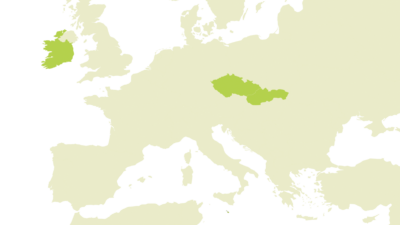Until the elections in May, the web version of our application How to Vote reached over 23.300 people, with a peak of 1.427 users on a single day (20th May). The immense amount of work that has been dedicated to the creation of our informational platform has paid off. This assessment even has to be underlined by the fact that after our platform was launched, other websites were created with the same intention, most prominently the official webpage of the European Parliament for its elections, which offered a similar informational tool on how to vote. Nevertheless, our How to Vote app still holds the leverage of being more user-friendly towards young voters, being simple to use and easy to download. While we are glad that we were able to inform such an amount of voters about the election process, it also points towards problems in the current system.

Usage of howtovote.eu over time
Most of the member states have their registration deadlines for people that need to vote from abroad – if they offer it at all – months ahead of the elections. As the statistics on the usage of our application indicate, many people do not actively engage with the European Parliament elections that far in advance and might, therefore, once they learn about the registration process, still not be able to cast their vote as the deadlines have passed.
Another indicator is the fact that most referrals to the webpage came from Google. One could interpret that people did not know how the voting process works and therefore looked for further information on the internet using search engines. As a long term goal, election regulations should be harmonized and education about the participation in the democratic process should be improved so that there is no need to search for information online.
Through our work on the topic, the Y Vote team would like to advocate for its ideas and demands with decision-makers. In order to facilitate voting procedures and therefore engage people in the democratic process the following steps should be taken:
While conducting our research, we found such a broad variety of differences that it was difficult explaining all of them in our application without creating an information overload. While some differences of the voting regulations, such as the specific date of the election, are based on national habits and should therefore not be adjusted, there are also other rules that could be simplified to reduce national differences. While we are aware of the fact that voting regulations are subject to subsidiarity, we believe that it has to be in the common interest of all democratic governments to increase the accessibility towards elections. Finding a common line and adjusting regulations is a crucial step towards a more equal treatment of citizens of different European Union member states.
We are aware of the fact that bureaucratic processes take their time and that formal registration of voters is no different in that regard. However, as we have shown in the graphic above, we have learned that a vast majority of voters did not actively engage with the European Parliament elections until shortly before they took place. Under specific conditions, eligible voters need to proactively register in order to be able to cast their vote. This is especially relevant for European Union citizens living in a country other than the one they have the nationality of, for example for students using the Erasmus program or for people that have changed their country of residence for work purposes. In order to be able to cast their vote, citizens need to be added to the electoral roll of the country they decide to vote in.
For the 2019 elections, the different EU member states applied deviating provisions on the deadlines for registering on their electoral roll, ranging from the end of February in some countries to a few days prior to the elections at the end of May. If we connect these differences with the empirical evidence that we gained from our data – which showed an immense increase of usage only about a week before the elections – we believe that early registration deadlines are an unnecessary obstacle for all those people that do not engage with the elections far ahead of the actual date.
Besides the differences in the registration deadlines, also the formal regulations on how voting is offered has an immense impact on the accessibility of the European Parliament elections. As we have stated above, the numerous opportunities of the Schengen area have to be met with provisions in other fields of our daily lives in order to not create disadvantages for people leaving their country of nationality to live, study or work in another country. While Directive 93/109/EC aims to guarantee the principle of equality and allows EU citizens to vote either in their home country or, if applicable, in their country of residence, member states influence the degree of freedom by choosing which forms of voting they provide to the electorate.

Citizens of the Czech Republic, Ireland, Malta and Slovakia can not cast their vote abroad.
The most accessible system is the Estonian, which allows its citizens to vote online. Estonians thereby can freely move between places without having to worry about how to cast their vote. While the Estonian system is a positive but isolated case, most other member states of the European Union also provide opportunities for their nationals to vote from abroad. Some countries allow voting by post, others allow their citizens to vote in embassies and consulates. However, there are also member states which do not offer any of those options. The Czech Republic, Ireland, Malta and Slovakia do only allow voting on their national territory. This fact will inevitably lead to European citizens being unable to vote for politicians of their home countries. In the case of Romania, legal provisions were made allowing their citizens to vote from abroad. On the day of the elections, however, the infrastructure was insufficient, leading to reports from several European cities where Romanians were not able to cast their vote. These developments are very questionable from a normative point of view, as European citizens are not treated equally and do not enjoy the same accessibility to the European Parliament elections. We demand all member states to adopt provisions that allow for convenient participation in the European Parliament elections, also for their citizens living abroad.



Florian is a student of Political Science and Public Administration at the University of Konstanz with a focus on International Administration and Conflict Management, currently residing in Leuven where he takes part in the Erasmus program. He holds a bachelor degree in Political Science from the Otto-Friedrich-Universität in Bamberg, where he first got in touch with AEGEE in 2013. His belief in the importance of democratic participation was the driving force for his decision to take over the position as Voting Guide Manager within the Y Vote team.